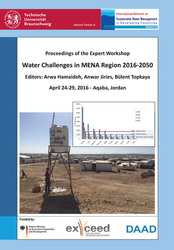| Areas | |
|---|---|
| Serie de libros (97) |
1381
|
| Nachhaltigkeit |
3
|
| Gesundheitswesen |
1
|
| Letra |
2369
|
| Ciencias Naturales |
5408
|
| Matemática | 229 |
| Informática | 319 |
| Física | 980 |
| Química | 1364 |
| Geociencias | 131 |
| Medicina humana | 243 |
| Estomatología | 10 |
| Veterinaria | 108 |
| Farmacia | 147 |
| Biología | 835 |
| Bioquímica, biología molecular, tecnología genética | 121 |
| Biofísica | 25 |
| Nutrición | 45 |
| Agricultura | 1005 |
| Silvicultura | 201 |
| Horticultura | 20 |
| Ecología y conservación de la tierra | 148 |
| Ciencias Ingeniería |
1795
|
| General |
98
|
|
Leitlinien Unfallchirurgie
5. Auflage bestellen |
|
Erweiterte Suche
Water Challenges in MENA Region 2016-2050 (Tienda española)
Proceedings of the Expert Workshop, April 24-29, 2016 - Aqaba, Jordan
Müfit Bahadir (Editor)Previo
Indice, PDF (99 KB)
Lectura de prueba, PDF (270 KB)
Middle East and North Africa Region (MENA) is one of the water scarcest regions on earth. There, lack of water resources is common, and water scarcity has become an increasing constraint to their economic development, particularly of the agriculture, which is the biggest water consumer. Many countries in this region have been exploiting their non-renewable fossil water resources in order to relieve the acute pressure of water stress, depleting their resource base, and undermining their long-term economic development and food security, with additional consequences for human health and the environment. Disputes over water lead to tension within communities, and unreliable water services are prompting people to migrate in search for better living conditions. Water investments absorb large amounts of public funds, which could often be used more efficiently elsewhere. These challenges appear likely to escalate.
Besides the availability of water, the efficiency of usage, e.g. in the agriculture, the suitability of plants cultivated, the yield values, etc. plays also an important role in decision making processes. As the region’s population continues to grow, water availability per capita is set to fall by 50% by 2050, and most of the countries in the region are going to face with “absolute water scarcity”.
The expert workshop aimed at evaluating the options for coping with water scarcity through assessing the water demand and supply up to the year 2050, thereby considering issues like climate change, population growth, and economic development.
| ISBN-13 (Impresion) | 9783736994522 |
| ISBN-13 (E-Book) | 9783736984523 |
| Formato | B5 |
| Idioma | Inglés |
| Numero de paginas | 120 |
| Edicion | 1. Aufl. |
| Lugar de publicacion | Göttingen |
| Fecha de publicacion | 27.01.2017 |
| Clasificacion simple | Proceeding |
| Area |
Agricultura
|
| Palabras claves | Water resources, Water Scarcity, economic development, agriculture, food security, human health, environment, migration, climate change, population growth |
| URL para pagina web externa | http://www.exceed-swindon.org/ |








